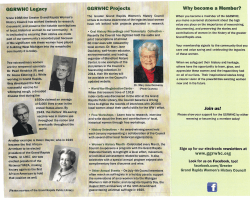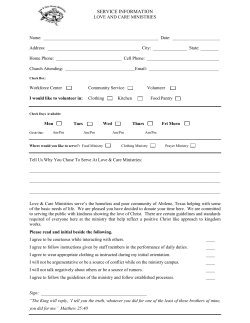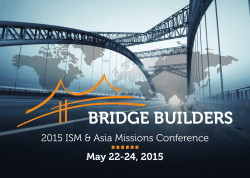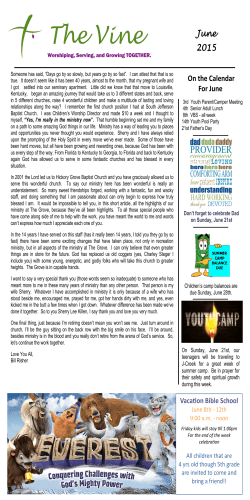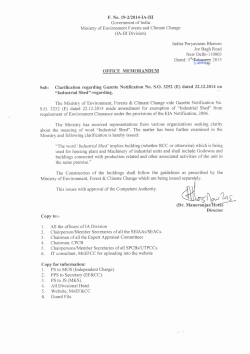
505.515 Theology and Praxis of Global Ministry
LAIDLAW COLLEGE Te Wananga Amorangi 505.515 Theology and Praxis of Global Ministry Course Assessment and Delivery Outline Campus: Christchurch Lecturer: Jon Slack Semester 1, 2015 NQF Level: 5, 15 credits COURSE OVERVIEW Week 1. Engaging Context I - Introduction What in the world is God up to? – tracking the trends; explanation of course Week 2. Entering Story – Mission The Story of God; engaging and reframing the Gospel Week 3. Engaging Context - Mission Engaging culture: a theology of culture and models of engagement; modernism and postmodernism. Week 4. Engaging Context - Mission The context, issues and models of global cross-cultural mission Week 5. Entering Story - Ministry What is the church? Biblical and historical engagement on ecclesiology Week 6. Entering Story - Ministry The story of God at work and the history of the church in Aotearoa- New Zealand. Week 7. Engaging context Ministry Contemporary local and global models for church and ministry and leadership. Week 8. Embracing Calling I Foundations for sustaining the long-term practice of global mission Week 9. Embracing Calling II Foundations for sustaining the long-term practice of ministry and leadership Week 10. Embracing Calling III The church for the whole people of God: empowering pastor and equipping church Week 11. Embracing Calling IV Ministry through the stages of life – resourcing Christians for the journey of faith. Week 12. Embracing Calling V Women in ministry – learning from the experience of women in leadership. (Please note: dates may change for session depending on availability of particular speakers) AP 2014 ASSESSMENT TASKS, DUE DATES AND LEARNING HOURS The requirements of the course are as follows: 1) Completion of assigned weekly pre-reading and blog (on Moodle) (35%). This blog will demonstrate personal observations and reflection on assigned readings. Reading and blog should be completed prior to class for that week. Learning Outcomes: 1, 2, 3, 5 Grading Criteria: • Evidence of completion of and interaction with required pre-reading. • Consistent reflection as evidenced in blog entries. • Participation in class discussions and activities. Detailed instructions for these readings are available separately in Assignment 1: Set Readings and Responses document. 2) An integration project of 1800 words (40%). Due: April 10 at 11:55pm Learning Outcomes: 1, 2, 5 Grading Criteria: • Clear and careful analysis of relevant issues in relation to a country • Integration of Biblical foundation with an appropriate response • Description and analysis of an organization’s response to the issue • Personal reflection and application • Communication & Presentation: Clarity, arrangement of ideas, spelling, grammar; sufficient reading and research evident; referencing and bibliography Based on your reading and inventories over the course of the class: a) Select and briefly explain one (or an aspect of one) of the five big global issues – urbanisation, poverty, globalization, wars/violence, or disease. Identify a country in which this issue is particularly significant. Profile the country and articulate factors that have contributed to the prominence of this issue. b) Explore how the Biblical themes of redemption, God’s reign, and Christ’s call to compassion and justice speak to the global issue you have chosen. What scriptural themes and passages provide insight for us? What might a compassionate and just response look like in light of these themes and passages? c) Discuss some Christian (and perhaps other) responses to your selected global issue in your selected nation. Identify publications and websites that document the actions. Respond to these questions: what interventions/strategies have been effective? What interventions/strategies do not seem to be effective? Why or why not? Example organizations: World Vision Tear Fund Oxfam Salvation Army Youth With A Mission Amnesty International Two Futures Project Refugee Services Red Cross d) Personal application: How will awareness of this issue practically impact how you think and 505.515 Theology and Praxis of Global Ministry Course Assessment and Delivery Outline – Christchurch 2 act? What will be different about your everyday life as a result of conviction of a call to action versus apathy? Name some specific gifts and talents you possess and identify ways these can be used to express the gospel in addressing the needs you have identified in this project. 3) Completion of one reflective essay of 1200 words (25%). Due: May 29 Learning Outcomes: 1, 3, 4, 5 Grading Criteria: • Well presented summary of interview material covering all 3 questions • Understanding of ideas presented by Ward • Personal reflection and application • Communication & Presentation: Clarity, spelling, grammar, referencing and bibliography a. Interview: Interview one key leader of a church (this can be your own). Use the following three questions to structure your interview. 1) What people or movements have been most influential in shaping your ministry? 2) What are the biggest challenges the church in New Zealand faces now? 3) How are you and your church working to address some of these challenges? b. Reflect: Read “Christendom, clericalism, church and context: finding categories of connexion in a culture without a Christian memory” Stimlus, Vol. 10, No. 1, Feb. 2002, pp. 52-60 by Kevin Ward. c. Integrate: Write a reflective essay including the following elements: • a summary of the answers to your interview questions • your personal response to the issues the interview and the reading from Ward raised for you • any insights that might shape your future ministry or choices? ANALYSIS OF LEARNING HOURS and MARKS Class time 36 hours Pre-reading, reflection and blogging time 48 hours 35% Project 42 hours 40% Reflective Essay 24 hours 25% Total 150 hours 100% COURSE MATERIALS All students will be provided with access to the Theology and Praxis of Global Ministry course area in Moodle. Course outlines, reading guides and assignment cover sheets will be available there. SET TEXTS There is one required textbook for all students in this introductory course: Adeney, Miriam. Kingdom Without Borders: The Untold Story of Global Christianity. Downers Grove, IL:IVP, 2009. 505.515 Theology and Praxis of Global Ministry Course Assessment and Delivery Outline – Christchurch Campus 3 ADDITIONAL READING The following works offer opportunity for other perspectives and areas of focus on the theology and praxis of ministry. Books Addison, Steve. Movements that Change the World. Smyrna, DE: Missional Press, 2009. --. What Jesus Started: Joining the Movement, Changing the World. Downers Grove: Intervasity Press, 2012. Barker, Ashley. Surrender All: A Call to Sub-merge with Christ Melbourne: Urban Neighbours of Hope, 2005 Bolger, Ryan K. The Gospel after Christendom. Grand Rapids: Baker Academic, 2012. Boyd, Gregory A. The Myth of a Christian Religion: Losing Your Religion for the Beauty of a Revolution. Grand Rapids: Zondervan, 2009. Dyrness and Karkkainen (eds). Global Dictionary of Theology. Downers Grove, IL: IVP Academic, 2008. Gelder, Craig Van and Zscheile, Dwight J. The Missional Church in Perspective: Mapping Trends and Shaping the Conversation. Grand Rapids: Baker Academic, 2011. Gibbs, Eddie. ChurchMorph: How Megatrends Are Reshaping Christian Communities. Grand Rapids: Baker Academic, 2009. Gibbs, Eddie and Bolger, Ryan K. Emerging Churches: Creating Christian Community in Postmodern Cultures. Grand Rapids: Baker Academic, 2005. Goheen, Michael W. A Light to the Nations: The Missional Church and the Biblical Story. Grand Rapids, MI: Baker Academic, 2011. Grenz, Stanley J. Created for Community: Connecting Christian Belief with Christian Living. Grand Rapids, MI: Baker Books, 1997. Hirsch, Alan. The Forgotten Ways: Reactivating the Missional Church. Grand Rapids: Brazos Press, 2006. Johnstone, Patrick. The Future of the Global Church: History, Trends and Possibilities. Colorado Springs: Biblica, 2011. King, Michael. The Penguin History of New Zealand. Auckland, New Zealand: Penguin Books, 2003. McLaren, Brian. Everything Must Change: Jesus, Global Crises, and a Revolution of Hope. Nashville, TN: Thomas Nelson, 2007. Ott, Craig and Netland, Harold A. Globalizing Theology: Belief and Practice in an Era of World Christianity. Grand Rapids, MI: Baker Academic, 2006. Pearcey, Nancy. Total Truth: Liberating Christianity from its Cultural Captivity. Wheaton, IL: Crossway Books, 2004. Sine, Tom. The New Conspirators: Creating the Future One Mustard Seed at a Time. Downers Grove: InterVarsity Press, 2008. Volf, Miroslav. A Public Faith: How Followers of Christ Should Serve the Common Good. Grand Rapids: Brazos Press, 2011. Wright, Christopher. The Mission of God’s People: A Biblical Theology of the Church’s Mission. Grand Rapids: Zondervan, 2010. Wright, Tom. Surprised by Hope. London: SPCK, 2007. Yancey, Phil. The Church: Why Bother? Grand Rapids, MI: Zondervan Publishing House, 1998. 505.515 Theology and Praxis of Global Ministry Course Assessment and Delivery Outline – Christchurch Campus 4 Articles Eshleman, Paul. “Reaching the Unengaged: It’s Time to Act,” Mission Frontiers, (January-February 2013). Accessed online: http://www.missionfrontiers.org/issue/article/reaching-the-unengaged Haney, Jim. “The Start of the Spread of the Gospel.” In Discovering the Mission of God: Best Practice for the 21st Century, ed. Mike Barnett, 309-322. Downers Grove: InterVasity Press, 2012. Hiebert, Paul and Tite Tienou, 2002. “Missions and Doing Theology.” In The Urban Face of Mission, ed. Harvey Conn, Manuel Ortiz and Susan Baker, 85-96. Philippsburg, N.J.: P & R Hybels, Bill. “The Art of Self-Leadership,” Leadership Journal (Summer, 2001) Keel, Tim. “An Efficient Gospel,” Leadership Journal (Winter, 2008) Keel, Tim. “Reframing the Gospel,” The Fermi Project: Q Shorts (October, 2008) Nouwen, Henri. “Moving from Solitude to Community to Ministry.” Ward, Kevin. “Christendom, clericalism, church and context: finding categories of connexion in a culture without a Christian memory” Stimlus, Vol. 10, No. 1, Feb. 2002, pp. 52-60 *Wright, Christopher. “Word of God and Mission of God.” In Discovering the Mission of God: Best Practice for the 21st Century, ed. Mike Barnett, 33-48. Downers Grove: InterVasity Press, 2012 Websites World Vision http://www.worldvision.org.nz Tear Fund http://www.tearfund.org.nz/ Oxfam http://www.oxfam.org.nz/ Salvation Army http://salvationarmy.org.nz/ Christians Against Poverty http://www.capnz.org/ Marine Reach (YWAM) http://mrmdts.org/ Amnesty International http://www.amnesty.org.nz/ Refugee Services http://www.refugeeservices.org.nz Red Cross http://www.redcross.org.nz Two Futures Project http://twofuturesproject.org/ Other Sites of Interest World Bank http://www.worldbank.org/ The United Nations http://www.un.org/english/ Voice of the Martyrs http://www.persecution.co.nz/ Operation World http://operationworld.org/ Joshua Project http://joshuaproject.net/ Issachar Initiative http://issacharinitiative.org/ Global Media Outreach http://globalmediaoutreach.com/ Mission Frontiers http://www.missionfrontiers.org/ People Groups http://www.peoplegroups.org Commission Stories http://www.commissionstories.com 505.515 Theology and Praxis of Global Ministry Course Assessment and Delivery Outline – Christchurch Campus 5
© Copyright 2026

